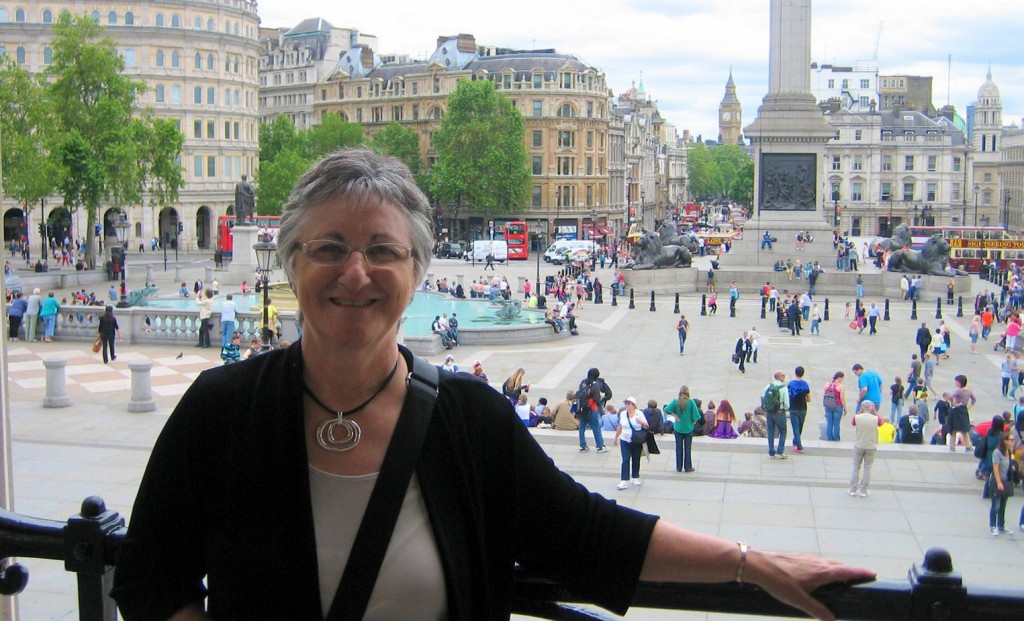“Dorcas Miller Lehman participated the Eastern Mennonite Seminary (EMS) Lancaster cross-cultural course in June 2012 to the United Kingdom. Dorcas has pursued an MDiv degree alongside her work as campus pastor at Lancaster Mennonite School. She in on the last lap of this journey, expecting to graduate in May 2013. She is a member of East Chestnut Street Mennonite Church in whose newsletter this article also appears.”
After years of listening to many others travel the world and bring their stories home, my turn for an overseas trip came in June. So I felt privileged and grateful to receive travel tips and blessings from those of you who knew I was going. Led by Eastern Mennonite Seminary professor Steve Kriss, my class, “Struggle and Hope in Post-Christendom,” spent ten days in the United Kingdom in significant conversations and lectures with at least 30 folks in the Anabaptist Network.
We started in Bristol in the home of Sian and Stuart Murray, our primary instructor. (Some of us know Stuart best as author of The Naked Anabaptist.) Next was Birmingham, where our visit included seeing the new Menno House, a ministry recently relocated from London Mennonite Centre. And Sunday church was a prayer walk with Peace Church through a park that would be a venue for the Olympics. We ended our sojourn in East London, where we walked with Urban Expression workers in low-income housing estates. Everywhere banners announced London 2012.
“Exegete your neighborhood!” This is a first, important, often at least year-long step in knowing what shape ministry might take. And only then might one ask, “What kind of space do we need for this ministry?” This question pops up naturally in a context where the selling of “redundant churches” has become a specialty of some real estate agents. The space found might be a house, a street corner, a shared church building, park, pub or other community space – whatever fits the ministry.
In one East London neighborhood, for example, a former garbage dump became a playground where neighbors now mingle daily while their children play. This community-organizing effort has been sustained in an area where over 95% of the residents, including children, do not go to a house of worship on Sunday morning.
So the questions naturally follow: What is church? When should church invite people in, and when should church go out to the people? We learned about table fellowships and table liturgy, simple church, re-cathedraling, and hyphenated Anabaptists.
The UK has only two Mennonite congregations, but the Anabaptist Network links people of diverse Christian backgrounds through shared core convictions. People meet in study groups, table fellowships, and urban ministries. They write, discuss, and publish – such as a series of books about church after Christendom. Ekklesia, a faith-and-politics think tank, explores questions of church and state. Some questions sound like ours, but the debate about the 24 bishops in the House of Lords reminded me I was in the UK, not the US. All this occurs with full awareness that church in this culture has moved from the center to the margins.
Spending many hours walking was one way we got the picture. In Birmingham we walked in the Peace Garden at St. Thomas, a church building that was half demolished by bombing in 1940. It was not rebuilt, so that people would not forget. But in 1995 it was redesigned as a peace monument. When the G-8 Summit met there in 1998, world leaders brought messages of peace. These plaques now hang on ruined walls in the garden’s beauty. On prayer pilgrimages in these cities, storytellers often pointed out some visual memory of destruction and rebuilding.
Some people say these are dismal times, and I think they may be right. But among these British adults and children, I felt inspired by the intelligent work infused with commitment. I am intrigued and convinced by their imaginative thinking and long patience. Was it that exposure, or was it the marmalade, meat pie, curry, and the cool British summer that made me think, “If this is what it is to be a ‘naked Anabaptist,’ I want to be one too! “
